
AAAP in the Media
Displaying 1 - 12 of 23
Can today’s Adaptation Action minimize future losses and damages in Africa?
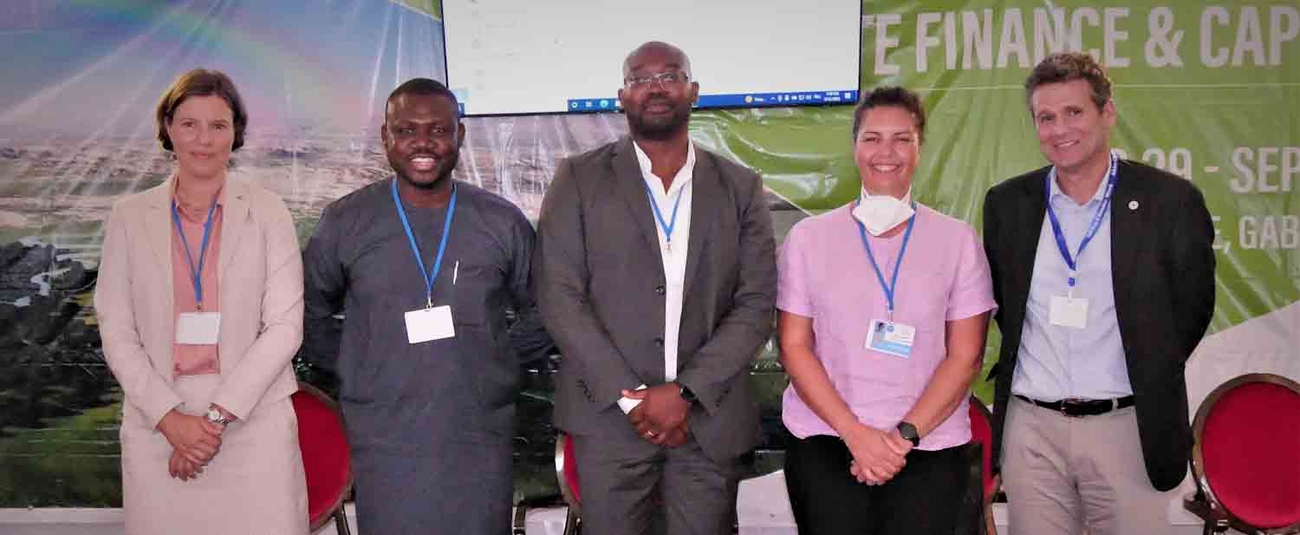
On the sidelines of the 2022 edition of Africa Climate Week(link is external), a session titled Limiting Loss and Damage through Enhanced Adaptation Action in Africa featured vibrant and timely discussion of an aspect of climate change that typically receives little attention: capturing and assessing the costs and damages associated with climate change.
The African Development Bank and Germany’s Konrad Adenauer Foundation hosted the event, which provided a forum for panelists and participants to discuss the importance of defining and evaluating such losses and damages of properties, economies, lives and livelihoods due to climate disasters. Africa is acknowledged to be the continent most vulnerable to climate change.
Moderator Olufunso Somorin, a Regional Principal Officer at the African Development Bank, opened the discussion. He pointed out that it is important for African countries to measure climate-change related loss and damage to enable appropriate quantification and well-designed responses best suited to country context. It was also important to capture those losses occurred even in instances where preventive climate adaptation actions had been taken, he added.
Fatten Agad, Africa Climate Foundation’s Senior Advisor on Climate Diplomacy and Geopolitics, called for production of a report that would serve as guidance and baseline for evaluating climate related losses and damage. “It has already been demonstrated that the socio-economic impact faced by African countries in coping with the Covid-19 crisis has been very high, and adding a burden of financing something such as loss and damage would be unfair,” she said.
Anja Beretta, Konrad Adenauer’s Director for Energy Security and Climate Change in Africa, urged African countries to integrate mechanisms to address losses and damage into their Nationally Determined Contributions (NDCs). She also called for designated institutions and functioning structures to ensure the efficient and effective use of climate finance to advance the discussion on financial flows into loss and damage.
Stephane Bonamy, Head of the Regional Delegation for the International Committee of the Red Cross in Cameroon, said, for countries that face both conflict and climate change impacts, it is imperative that preventive measures are put in place early enough to reduce the extent of loss and damage faced and lessen the burden on communities.” He noted that 14 of the 25 most vulnerable countries to climate change impacts worldwide also face some form of conflict.
Dr Olumide Abimbola, the Executive Director of the Africa Policy Research Institute in Berlin reiterated the need for more African examples of past and current loss and damage to be incorporated into textbooks and journals.
There was agreement among the participants on the need for Africa to prioritize timely, comprehensive and large-scale adaptation action to avert or minimize future losses and damages.
There was also consensus on the urgent need to scale up financial flows from public and private sources into adaptation action across Africa. They cited the African Development Bank’s Africa Adaptation Acceleration Program, a joint initiative with the Global Center on Adaptation, as a positive example. The program seeks to mobilize $25 billion over five years to accelerate and scale climate adaptation actions across the continent.
Participants also called for new strategic partnerships to drive adaptation policies, plans and investments in Africa through the implementation of NDCs and tapping synergies with such initiatives as the Africa Disaster Risk Financing program.
About the African Climate Week (ACW)
ACW is an annual event that engages and empowers stakeholders to drive climate action across countries, communities and economies. The event is organized by UN Climate Change in collaboration with global partners UN Development Programme, UN Environment Programme and the World Bank Group. Partners in the region include the Africa Union, the Africa Development Bank, the UN Economic Commission for Africa (UNECA). ACW 2022 was hosted in Gabon.
Africa Adaptation Dialogue: implementing the vision at the Africa Climate Week
What: Africa Adaptation Dialogue: implementing the vision
When: 31 August 09:30 - 10:30 CAT
Where: Libreville, Gabon
Who: Global Center on Adaptation; Africa Adaptation Initiative (Chaired by Gabon); African Development Bank
Despite contributing the least to global warming, Africa finds itself on the frontline of the climate emergency, with the impacts of external shocks exacerbating these vulnerabilities. Indeed, large portions of Africa—particularly the drylands that cover three-fifths of the continent—are warming at a rate twice the global average, putting half a billion people at risk.
Chaired by Gabon, the Africa Adaptation Initiative (AAI) aims to strengthen collaboration on adaptation across the continent. To implement this vision, the Global Center on Adaptation and the African Development Bank have jointly developed the Africa Adaptation Acceleration Program – AAAP. This Africa-led, Africa-owned response is mobilizing $25 billion for climate adaptation investments in the continent over five years. This event will review progress of the AAAP and how it is contributing to narrowing the finance gap, thus accelerating the implementation of AAI.
Program
- Welcome Remarks by the Moderator
Davinah Milenge Uwella – Principal Programme Coordinator, African Development Bank
- Opening Video
- Opening Remarks
Dr. Kevin Kariuki – Vice President, Power, Energy, Climate Change and Green Growth, AfDB
- Framing remarks: The Africa Adaptation Initiative and the AAA
Tanguy Gahouma-Bekale – Special Advisor to His Excellency Ali Bongo Ondimba, President of the Gabonese Republic, Permanent Secretary of the National Climate Council
- The AAAP as the vehicle to implement the AAI vision
Prof. Anthony Nyong – Senior Director, and Africa Regional Director, Global Center on Adaptation
AAAP voices from the field
- AAAP partners and beneficiaries
Moderated discussion with participants
- Wrap up by the Moderator
Multi-Stakeholder Dialogue on Climate Risk Assessment and adaptation options prioritization for the Transgabonaise road corridor PPP project
What: This is a private event
Where: Global - Virtual
When: 19 April 2023, 0:00
This first Multi-Stakeholder Climate Risk Dialogue will present the preliminary results of the high-resolution climate hazard modelling outcomes, and vulnerability assessment of the road corridor project.
Event description:
As part of the Global Center on Adaptation’s support to the Transgabonaise road corridor project under the Africa Adaptation Acceleration Program (AAAP), a Multi-Stakeholder Climate Risk Dialogue was organized to present results from the climate risk assessment with the African Development Bank, and project partners including the Societe Autiroutiere du Gabon (SAG), and the government of Gabon’s departments of Environment, Weather, and transport.
Historical weather trends, in Gabon, show an increase in mean annual temperatures of +1ºC since 1981, and decrease in mean annual rainfall, at an average rate of 3.8 mm per month per decade since 1960, with regional disparities. The technical assistance provided by the GCA will support an in-depth understanding of future climate hazards under different climate change scenarios, and across the different regions crossed by the 900km road corridor, and led to identify and provide a cost-benefit analysis of adaptation and resilience options to mitigate these current and future climate hazards.
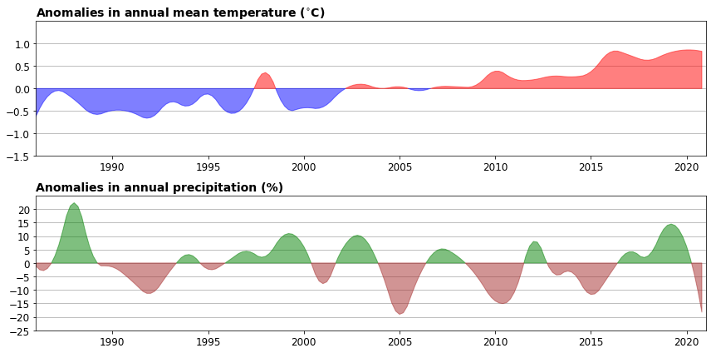
Figure 1: Climatology in Gabon: Historic evolution and trends, Source GCA – study from Royal Haskoning, Lobelia Earth, April 2023.
This First Multi-Stakeholder Climate Risk Dialogue will present the preliminary results of the high-resolution climate hazard modelling outcomes, and vulnerability assessment of the road corridor project. Especially, the project stakeholders will discuss the main climate hazards that have been highlighted, including extreme temperatures, extreme precipitation, drought intensity, and how these climate events might impact the assets and transport services. The discussion with local stakeholders will contribute to ensure robustness of the project outcomes.
Africa Adaptation Dialogue: implementing the vision
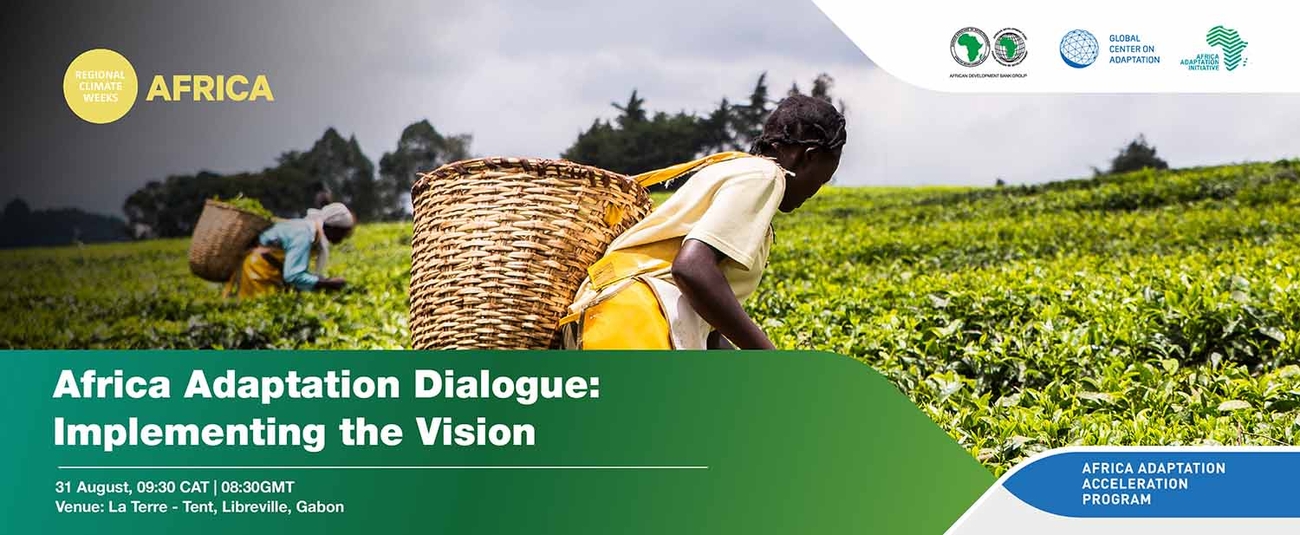
What: Africa Adaptation Dialogue: implementing the vision
When: 31 August 09:30 - 10:30 CAT
Where: Libreville, Gabon
Who: Global Center on Adaptation; Africa Adaptation Initiative (Chaired by Gabon); African Development Bank
Despite contributing the least to global warming, Africa finds itself on the frontline of the climate emergency, with the impacts of external shocks exacerbating these vulnerabilities. Indeed, large portions of Africa—particularly the drylands that cover three-fifths of the continent—are warming at a rate twice the global average, putting half a billion people at risk.
Chaired by Gabon, the Africa Adaptation Initiative (AAI) aims to strengthen collaboration on adaptation across the continent. To implement this vision, the Global Center on Adaptation and the African Development Bank have jointly developed the Africa Adaptation Acceleration Program – AAAP. This Africa-led, Africa-owned response is mobilizing $25 billion for climate adaptation investments in the continent over five years. This event will review progress of the AAAP and how it is contributing to narrowing the finance gap, thus accelerating the implementation of AAI.
Program
- Welcome Remarks by the Moderator
Davinah Milenge Uwella – Principal Programme Coordinator, African Development Bank
- Opening Video
- Opening Remarks
Dr. Kevin Kariuki – Vice President, Power, Energy, Climate Change and Green Growth, AfDB
- Framing remarks: The Africa Adaptation Initiative and the AAA
Tanguy Gahouma-Bekale – Special Advisor to His Excellency Ali Bongo Ondimba, President of the Gabonese Republic, Permanent Secretary of the National Climate Council
- The AAAP as the vehicle to implement the AAI vision
Prof. Anthony Nyong – Senior Director, and Africa Regional Director, Global Center on Adaptation
AAAP voices from the field
- AAAP partners and beneficiaries
Moderated discussion with participants
- Wrap up by the Moderator
Gabon –The Transgabonaise Road Project
With improvements to the road, rail, shipping and aviation networks a key government goal, Gabon’s transport sector is undergoing a major transformation. While population pressure is modest, with around 1.7m people in the country, existing links are limited; the two largest cities, Libreville and Port-Gentil, had, until work began on one recently, no road connection.
The 828 km long Transgabonaise road is key as it connects Libreville (the capital and coastal city) and Franceville (third Gabonese city after Port-Gentil). It comprises several segments of the Routes Nationales (RN) 1 to 4. Despite its strategic importance, the road has suffered from substantial deterioration due to a lack of maintenance and increased traffic over the last decade, caused by the increase of population and lumbering.
The projects is supporting the rehabilitation of a succession of national roads in Gabon to make it a more efficient logistics axis.
Transgabonaise Road Project is divided into three stages:
- Libreville -AlembéStage
- Alembé -Mikouyi (via Lalara, Koumameyong, Booué, Carrefour Leroy)
- Mikouyi -Franceville
- High-resolution, asset-level climate risk and vulnerability assessments to quantify key climate hazards and associated risks to the road infrastructure assets along the entire road corridor
- Innovative solutions for climate smart transport asset management: Based on specific hazards identified including nature-based solutions (NBS) to optimize the resilience of the assets
- Operational performance metrics and standards for the service level agreement (SLA) based on the direct and indirect climate-related damages identified
- Improvement in the capacity and quality of the road infrastructure
- Creation of over 1,000 direct jobs and over 9,000 indirect jobs
- Saving on operational costs and travel time impacting both households and private sector development though lower transport costs
- Generation of safety benefits and lower greenhouse gas emissions
- Additional 200 billion CFA (or $302.4 million) to Gabon’s GDP (equivalent to ~1.9% according to the 2021 GDP)
- Increased connectivity within Gabon and with neighboring countries such as Cameroon, Equatorial Guinea and Congo-Brazzaville
- Promote economic growth through ease of transportation of goods and services efficiently, allowing businesses to access larger markets and expand their operations
- increased trade, investment, and tourism, stimulating economic development in both urban and rural areas in Gabon
- Enhances regional integration and cooperation by facilitating the movement of people, goods, and services across borders, fostering trade relationships and cultural exchange
- Improve accessibility to remote areas, providing people with better opportunities for education, healthcare, employment, and social services
USD 99.2 million
Global Leaders Rally Support and Finance for the Africa Adaptation Acceleration Program to Tackle Climate Change in Africa
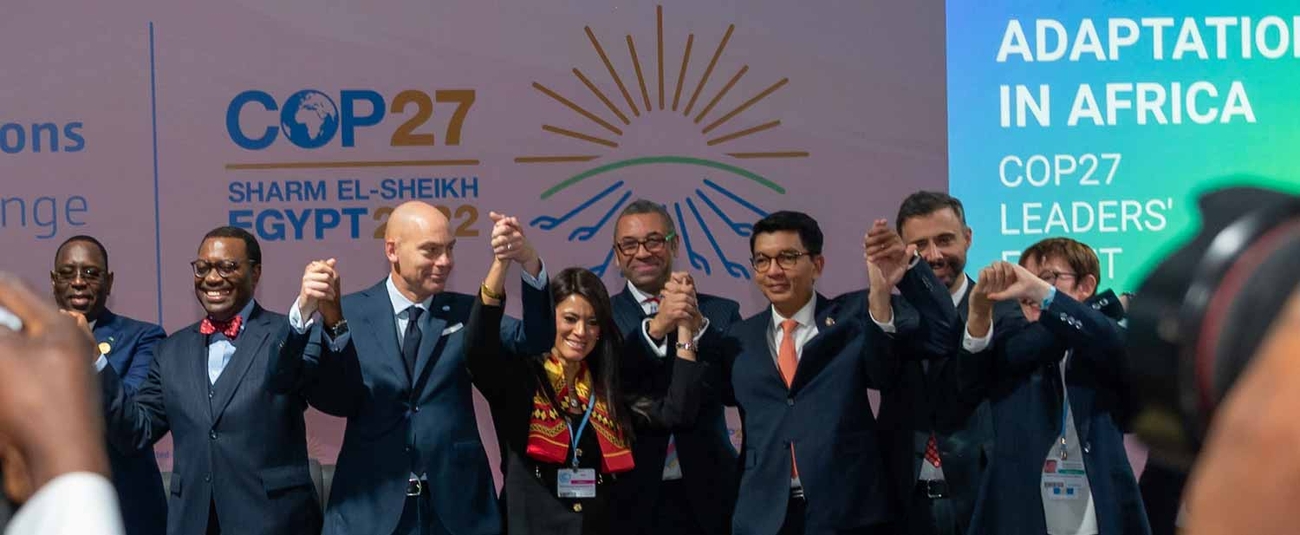
Global leaders on Tuesday rallied around climate adaptation for Africa. They attended the Africa Adaptation Leaders’ Event, convened by African Union Chair President Macky Sall of Senegal, Global Center on Adaptation CEO Patrick Verkooijen, and African Development Bank Group President Akinwumi Adesina.
The event took place at the global climate summit (COP27) in Sharm El-Sheikh, Egypt. It underscored the critical need for climate adaptation in Africa and responded to the call for the capitalization of the Africa Adaptation Acceleration Program (AAAP).
“This is a pivotal step in the fight against climate change,” African Union Chair President Macky Sall said. “The commitments made by Africa’s partners will give the Africa Adaptation Acceleration Program the boost that it needs to transform the development trajectory of the world’s most climate exposed continent. I am confident in the ability of the AAAP to deliver results for Africa.”
The Africa Adaptation Acceleration Program is an Africa-owned and Africa-led initiative developed by the Global Center on Adaptation (GCA) and the African Development Bank (AfDB) in close collaboration with the African Union. It serves as the implementation of the Africa Adaptation Initiative (AAI) to mobilize $25 billion to implement, scale and accelerate climate adaptation across the Africa. Since 2021, AAAP has mainstreamed climate adaptation in over$3.5 billion of investments in 19 countries.
United Nations Secretary-General António Guterres said: “I want to express my total solidarity for the Africa Adaptation Acceleration Program […] I urge the international community to support Africa to mobilize the technical & financial resources for scaling up transformative adaptation.”
“With this innovative program, Africa has developed a plan to grow, create jobs and opportunities for people, and to be resilient against the climate crisis,” said President Akufo-Addo of Ghana. “AAAP’s singular focus on the issue of climate adaptation will also contribute to greater stability and progress in Africa and around the world. AAAP is aligned with Ghana’s plans to address climate change as it chairs the Climate Vulnerability Forum (CVF) to lead efforts from the world’s most climate vulnerable countries to spur and mobilize investment through the Climate Prosperity Plans."
James Cleverly, Secretary of State for Foreign, Commonwealth and Development Affairs of the United Kingdom announced that the UK will provide £200 million to the African Development Bank’s Climate Action Window. This is in addition to the £20 million announced at COP26 in Glasgow to the AAAP Upstream Financing Facility.
Cleverly noted: “Climate change is having a devastating impact on countries in Sub-Saharan Africa facing drought and extreme weather patterns, which have historically received a tiny proportion of climate finance. This new mechanism […] will see vital funds delivered to those most affected by the impacts of climate change, much more quickly.”
Prime Minister Mark Rutte of the Netherlands followed through on the commitment made at the Africa Adaptation Summit held at the Global Center on Adaptation in September to confirm that the Netherlands will contribute EUR110 million to the AAAP, with EUR10 million in support for the Upstream Financing Facility hosted by GCA and EUR 100 million for the Climate Action Window of the African Development Fund at the African Development Bank as part of the Netherlands’ commitment to dedicate half of its climate funding, fully grant based, to climate adaptation, with a focus on Africa.
Norwegian Prime Minister Jonas Gahr Støre echoed African leaders’ calls for countries to rapidly scale up finance for climate adaptation, stating: “The climate crisis is here and now. Years of progress are at risk.”
“The AAAP Upstream Financing Facility is the delivery mechanism of adaptation and will use millions to leverage the billions that is required for adaptation,” he continued. “AAAP projects will generate effective climate adaptation outcomes. Adaptation is a growth agenda. A jobs agenda. And a prosperity agenda. On behalf of Norway, I am looking forward to continuing this partnership, investing in it, and supporting it with the Global Center on Adaptation.”
International Monetary Fund Managing Director Kristalina Georgieva emphasized the need to accelerate adaptation in Africa, stating: “It is paramount to support Africa’s adaptation because Africa will not reach its tremendous potential without it. AAAP complements the IMF’s Resilience and Sustainability Trust, which helps countries address external shocks such as climate change and ensure sustainable growth that can give Africa a chance to leapfrog outdated development models.”
African Development Bank Group President Dr. Akinwumi Adesina said: “Africa is suffering from the devastating effects of climate change. Our continent is being short changed by climate finance. The contributions towards the Africa Adaptation Acceleration Program’s Upstream Financing Facility and the Climate Action Window – which the African Development Bank manages – will help capitalize the program. With increased capital, we can better deliver the investment needed to bridge the adaptation finance gap. We want to ensure that the most vulnerable communities can benefit from a sustainable and prosperous future.”
Endorsing the outcomes of the high-level meeting, Patrick Verkooijen, CEO of the Global Center on Adaptation, closed with a statement emphasizing the AAAP’s impact to date, noting that “there is no pause button on the climate crisis. Africa must adapt to the threat of climate change, and it must adapt now.”
“Through the AAAP,” he continued, “Africa has charted its path towards a climate-resilient future for its youth, its economic growth, and for its prosperity.”
About the Global Center on Adaptation
The Global Center on Adaptation (GCA) is an international organization which works as a solutions broker to accelerate action and support for adaptation solutions, from the international to the local, in partnership with the public and private sector, to ensure we learn from each other and work together for a climate-resilient future. Founded in 2018, GCA is hosted by the Netherlands, working from its headquarters in Rotterdam with a knowledge and research hub based in Groningen. GCA has a worldwide network of regional offices in Abidjan, Côte d’Ivoire, Dhaka, Bangladesh and Beijing, China. Through this evolving network of offices and global and regional GCA teams, the organization engages in high-level policy activities, new research contributions, communications, and technical assistance to governments and the private sector.
About the African Development Bank
The African Development Bank Group is Africa’s premier development organization. Its overarching objective is to spur sustainable economic development and social progress in its regional member countries, thus contributing to poverty reduction across the continent.
The Bank Group achieves this objective by mobilizing and allocating resources for investment in African countries and providing policy advice and technical assistance to support development efforts.
In 2015, all multilateral development institutions agreed on the same set of objectives, the United Nations Sustainable Development Goals.
Learn more: https://www.afdb.org/
About the Africa Adaptation Acceleration Program
The Africa Adaptation Acceleration Program (AAAP) is a joint initiative of the African Development Bank and the Global Center on Adaptation (GCA). It aims to mobilize $25 billion, over five years, to accelerate and scale climate adaptation action across the continent. This ambition is delivered through the AAAP Upstream Financing Facility managed by the Global Center on Adaptation and the African Development Bank’s climate action window in the ADF replenishment. AAAP works across four pillars to achieve transformational results: Climate-Smart Digital Technologies for Agriculture and Food Security; African Infrastructure Resilience Accelerator; Youth Empowerment for Entrepreneurship and Job Creation in Climate Adaptation and Resilience and Innovative Financial Initiatives for Africa. AAAP has already guided over $3.5 billion of upstream investments in 19 countries with every dollar spent influencing $100 downstream.
COP27 - COP27 Leaders' Event, Accelerating Adaptation in Africa (DAY 2)
African Union welcomes the Netherlands’ contribution of EUR 110 million for the Africa Adaptation Acceleration Program at COP27
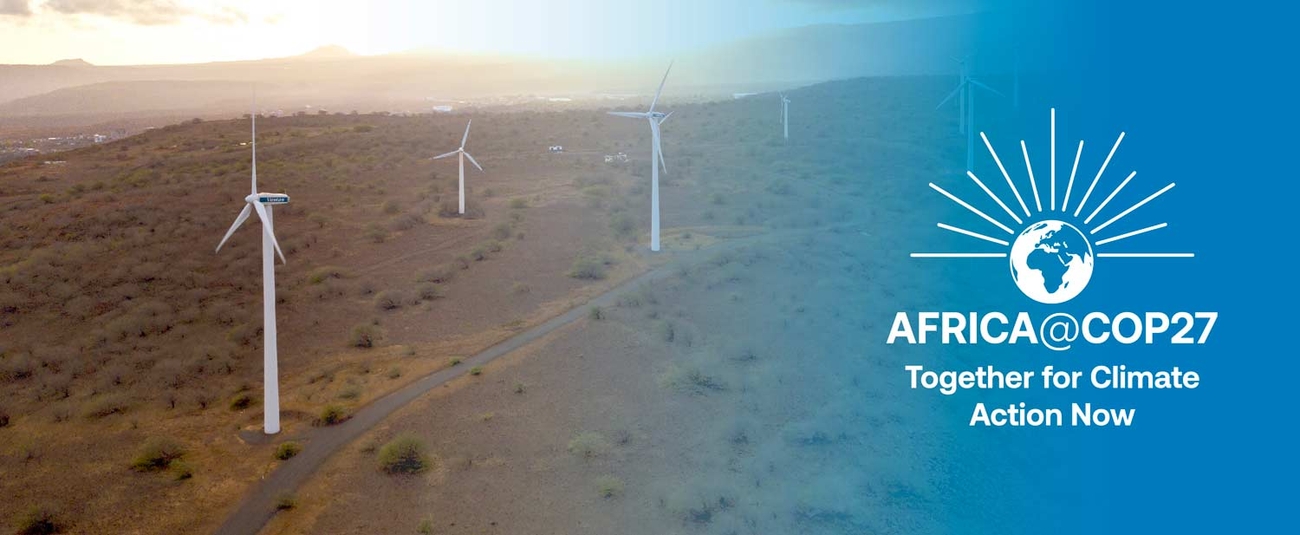
The African Union (AU) welcomed the Netherlands’ contribution of EUR 110 million in support of the Africa Adaptation Acceleration Program (AAAP) ahead of the COP27 Leaders’ Event on Accelerating Adaptation in Africa.
The Prime Minister of Netherlands Mark Rutte announced the financial commitment during a high-level meeting with Senegal’s President Macky Sall who is also the Chairperson of the African Union, Patrick Verkooijen, CEO of the Global Center on Adaptation, and the President of the African Development Bank Group Dr Akinwumi A. Adesina.
President Sall underlined the importance of action over words as world leaders meet this week to discuss the global response to the climate emergency, highlighting that “Africa is ground zero for the global climate breakdown. Nobody benefits if Africa fails to tackle it. The AAAP is Africa’s response to the climate crisis to leverage investments in adaptation and resilience not just to protect ourselves from the threat of climate change, but to drive a green economic growth agenda for prosperity.”
Prime Minister Rutte said “We have to face reality: climate change is already having lasting effects. Climate resilience must be our motto, climate adaptation our common endeavour. Adapting to climate change is in the DNA of the Netherlands and it is vital that we work with our partners in Africa to ensure investments flow through the bold and innovative roadmap that AAAP delivers for climate-proofing cities, farms, and infrastructure, to protect livelihoods and to ensure economic continuity.”
AAAP was developed by African Development Bank and the Global Center on Adaptation (GCA) to mobilize $25 billion by 2025 to implement, scale and accelerate climate adaptation across the African continent. This ambition is delivered through the AAAP Upstream Financing Facility managed by the Global Center on Adaptation and the African Development Bank’s climate action window which is developed in the context of the 16th replenishment of the African Development Fund, the Bank’s concessional arm that supports the continent’s low-income countries.
AAAP works across four bold interconnected pillars to achieve transformational results: Climate-Smart Digital Technologies for Agriculture and Food Security; African Infrastructure Resilience Accelerator; Youth Empowerment for Entrepreneurship and Job Creation in Climate Adaptation and Resilience and Innovative Financial Initiatives for Africa. AAAP has already guided over $3.5 billion of upstream investments in 19 countries with every dollar spent influencing $100 downstream.
Professor Patrick Verkooijen, CEO of Global Center on Adaptation welcomed the financial contribution from the Netherlands, thanking Prime Minister Rutte and President Sall for their leadership on climate adaptation in Africa to mobilize the global community to honor their commitment of doubling global climate finance at COP27: “AAAP’s catalytic interventions have already rapidly delivered impact at scale by mainstreaming adaptation into projects worth over $3.5 billion since 2021. The Netherlands’ support of EUR10 million for the AAAP Upstream Financing Facility will influence investments in adaptation worth a further EUR 1 billion for Africa.”
“This scale of impact is vital as Africa – indeed the world – is confronting multiple global shocks that are reverberating through our economies. AAAP gives impetus to the critical actions and global finance needed to address the climate and food crisis today, and to build a more resilient continent.”
Speaking at the high-level meeting, the President of the African Development Bank Group, Dr Adesina said: “The EUR 100 million financial support from the Netherlands towards the AAAP Climate Action Window of the African Development Fund is a major impetus for our efforts to bolster support for low-income countries of Africa that are most vulnerable to climate change”.
“It is a great start as we accelerate efforts to mobilize more climate adaptation financing for Africa through the AAAP. This is a great outcome right here at COP 27 –the Africa COP -- with a concrete action from Netherlands on adaptation finance for Africa. We look forward to other countries stepping up for climate adaptation in Africa as we approach the 16th replenishment of the African Development Fund in December.” Adesina said.
$2 million in prizes awarded at COP27 to African youth-led businesses
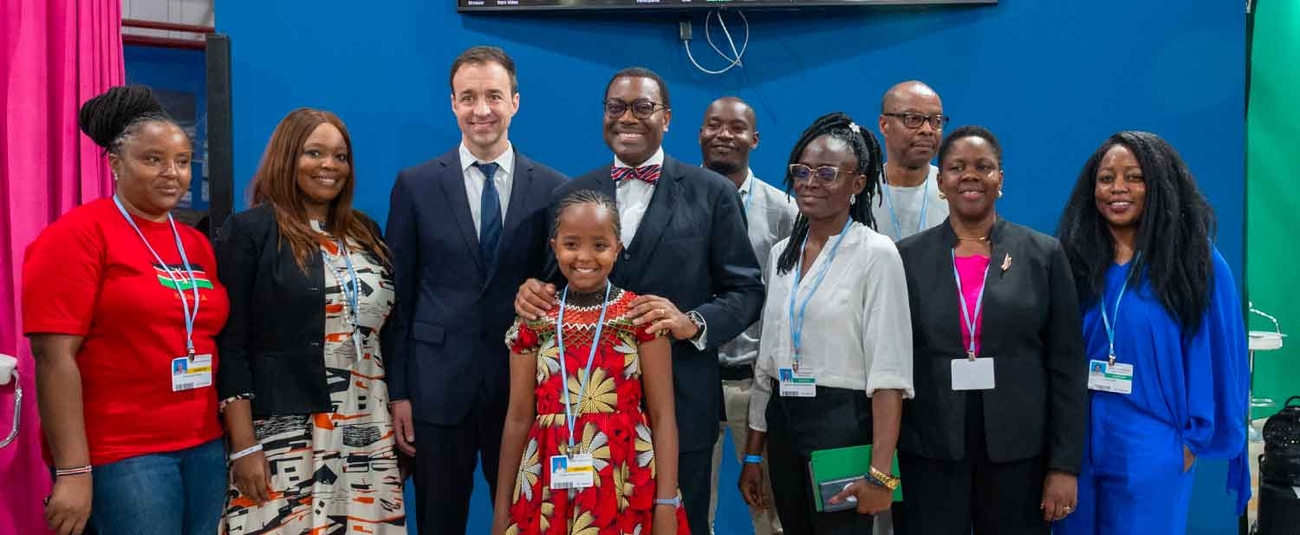
Twenty African youth-led enterprises have won grant funding of up to $100,000 each in this year’s African Youth Adaptation Solutions Challenge (YouthADAPT) competition. In addition to the grant, each winner benefits from a 12-month accelerator program to help them grow their businesses, deepen their impact and create decent jobs.
The annual competition and awards program for youth-led enterprises—which is 50% women-led—is jointly organized by the Global Center on Adaptation, the African Development Bank and Climate Investment Funds (CIF). The program is part of the Africa Adaptation Acceleration Program YouthADAPT flagship pillar(link is external).
The program boosts sustainable job creation by supporting entrepreneurship and youth-led innovations in climate change adaptation and resilience across Africa. The competition invites young entrepreneurs and micro, small, and medium-sized enterprises in Africa to submit innovative solutions and business ideas that can drive climate change adaptation and resilience.
Speaking at the awards ceremony, African Development Bank Group President Dr. Akinwumi Adesina, said: “Africa’s needs cannot be ignored. The youth must be at the center of everything we are doing about climate change. No young person is too young to engage in climate dialogue. Our young people must be part of the solution. They are creative, dynamic, and engaging. They are futuristic and must be part of the solution for climate adaptation in Africa.
“We want the youth to speak for Africa and develop solutions for the continent. For this initiative last year, we supported 10 youth-owned and youth-led businesses in Africa with $1 million. This year, we are supporting 20 businesses with $2 million. So, we can expect that next year, we will double efforts to $4 million dollars. That’s the way it’s going to go for Africa.”
Adesina observed that 80% of the winners’ businesses were in agriculture. He said: “Agriculture is the future of Africa. As you know, that has been my gospel for many decades. The lowest bar is for Africa to feed itself. The high bar is for Africa to feed the world. Agriculture is a business. I encourage our young people to do three things: Create, Adapt and Prosper. CAP for short.”
Norway’s Minister of International Development Anne Beathe Tvinnereim commended the enthusiasm that the competition generated among the youth. She said it is important to tailor climate solutions that could be scaled up for the various communities.
“That is where the youth of Africa come in – you see the problem; you see the solutions and you have the energy and the resources to deliver and we want to help you with that,” She said. She commended the African Development Bank and the Global Adaptation Center for creating the initiative.
Professor Patrick Verkooijen, CEO of the Global Center on Adaptation spoke about the impact of the award on one of last year’s winners, Juveline Ngum Ngwa from Bamenda in Cameroon who was able to scale up her business, Bleglee Waste Management. As a result of last year’s grant, she was able to open a second waste sorting factory and has developed further software for her drones which identify garbage which is blocking drainage systems.
He remarked: “Adaptation is good business. But it needs to be at scale. And that is exactly what the Africa Adaptation Acceleration Program – the AAAP – does. The AAAP is mobilizing $25 billion over five years to scale up and accelerate adaptation climate adaptation actions across Africa. And one of its four pillars is the YouthADAPT flagship program.”
The winning enterprises of the Youth Adaptation Solutions Challenge 2022 come from all parts of the continent. Half are female led. They are scaling innovations in critical social and economic sectors affected by climate change. These include agriculture, waste management, water resources and sanitation, renewable energy and energy efficiency.
The 2022 winners of the African Youth Adaptation Solutions Challenge are:
- Flushh, Namibia
- Green Impact Technologies, Malawi
- AgriTech Analytics, Kenya
- Baramoda, Egypt
- Cassavita, Cameroon
- Ecobarter, Nigeria
- Farmer Lifeline Technologies, Kenya
- Grocircular Agro Services, Nigeria
- IRIBA Water Group Ltd, Rwanda
- Mpatsa Engineering Company Limited (formerly Sustainable Water Irrigation and Farming Technologies), Malawi
- Viva Organica, Botswana
- Voltx for Engineering & Industries, Egypt
- West African Feeds, Ghana
- Kisumeo Organics Limited, Kenya
- Agroexpert farming, Senegal
- Eurl Algerienne Des Industries Technologiques, Algeria
- Lono, Côte d'Ivoire
- Pazelgreen Technologies, Nigeria
- Akatale On Cloud, Uganda
- Multi-Tech Sustainable Solutions (MTTS), Cameroon
Program organizers received 3,000 applications for this year’s competition. The top 50 were shortlisted to pitch their innovations before a jury.
About the Global Center on Adaptation (GCA)
The Global Center on Adaptation (GCA) is an international organization that works as a solutions broker to accelerate action and support for climate adaptation. It does this across a broad spectrum from local to international, in partnership with the public and private sectors. Founded in 2018, GCA operates from its headquarters in the largest floating office in the world, located in Rotterdam, the Netherlands. GCA has a worldwide network of regional offices in Abidjan, Côte d’Ivoire, Dhaka, Bangladesh and Beijing, China.
More information is available at www.gca.org
About the African Development Bank
The overarching objective of the African Development Bank Group is to spur sustainable economic development and social progress in its regional member countries, thus contributing to poverty reduction. The Bank Group achieves this objective by mobilizing and allocating resources for investment in regional member countries and providing policy advice and technical assistance to support development efforts. The African Development Bank allocates 67% of its climate financing funding to adaptation. The bank is looking to mobilize $25 billion that will go toward adaptation in addition to its effort to raise up to $13 billion for its African Development Fund, the bank’s concessional window for climate action during its latest replenishment phase.
Learn more: https://www.afdb.org/
About the Climate Investment Funds (CIF)
CIF is one of the world's largest and most ambitious multilateral climate finance mechanisms for developing countries seeking to shift to low carbon and climate resilient development and accelerate climate action. Its launch in 2008 emerged from recognition by world leaders that climate change and development are inextricably intertwined, and that climate-smart investment is needed at scale to deliver on the opportunities for green growth identified in the UN's Sustainable Development Goals (SDGs).
Learn more: https://www.climateinvestmentfunds.org/
UK steps up climate adaptation finance support for Africa
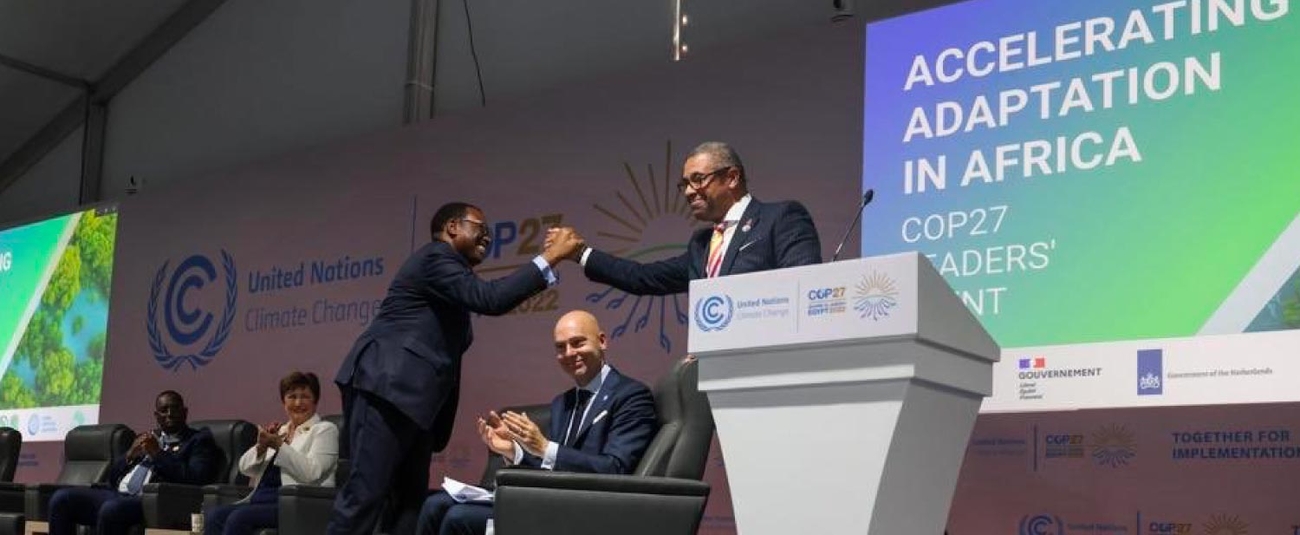
The United Kingdom has announced a significant increase in its financial support to the poorest African countries that bear the brunt of climate change.
Speaking alongside African leaders at COP27 in the Egyptian city of Sharm El Sheikh, British Foreign Secretary James Cleverly confirmed the UK will provide £200 million to the African Development Bank Group’s Climate Action Window, a new mechanism set up to channel climate finance to help vulnerable countries adapt to the impacts of climate change.
A number of countries on the continent have experienced extreme weather conditions from severe drought in Somalia to floods in South Sudan.
Foreign Secretary James Cleverly said: “Climate change is having a devastating impact on some of the poorest countries in Sub-Saharan Africa but historically they have received a tiny proportion of climate finance,” said Cleverly adding, “This new mechanism from the African Development Bank will see vital funds delivered to those most affected by the impacts of climate change, much more quickly.”
The UK Foreign Secretary noted, “Access to climate finance for emerging economies was a central focus at COP26 in Glasgow and I’m pleased to see tangible progress being made, supported today by £200 million of UK funding.”
Climate change has a disproportionate impact on the 37 poorest and least creditworthy countries in Africa. Nine out of ten most vulnerable countries to climate change are in Africa.
The Glasgow Climate Pact included a commitment from donors to double adaptation finance between 2019 and 2025.
Prime Minister Rishi Sunak announced at the weekend that the UK will surpass that target and triple adaptation funding from £500 million in 2019 to £1.5 billion by 2025. This funding package provided to the African Development Bank will be 100% preferenced for adaptation.
The Prime Minister also confirmed yesterday that the UK is delivering on the target of spending £11.6 bn on International Climate Finance (ICF) between 2021/22 and 2025/26.
The President of the African Development Bank Group, Akinwumi Adesina welcomed the additional funding from the United Kingdom and said,
“I applaud the UK government for this major contribution towards the capitalization of the Climate Action Window of the African Development Fund, as it seeks to raise more financing to support vulnerable low-income African countries that are most affected by climate change. This bold move and support of the UK will strengthen our collective efforts to build climate resilience for African countries. With increasing frequencies of droughts, floods and cyclones that are devastating economies, the UK support for climate adaptation is timely, needed, and inspiring in closing the climate adaptation financing gap for Africa.”
“I came to COP 27 in Egypt with challenges of climate adaptation for Africa topmost on my mind. The support of the UK has given hope. I encourage others to follow this leadership on climate adaptation shown by the UK”, said Adesina.
Climate risk regulation in Africa’s financial sector and related private sector initiatives
Extreme weather phenomena such as rising temperatures and the increasing frequency of droughts and floods are affecting lives and livelihoods in Africa. According to the Global Climate Risk Index 2021,1 five African countries ranked among the 10 countries most affected by extreme weather in 2019: Mozambique (first), Zimbabwe (second), Malawi (fifth), South Sudan (eighth), and Niger (ninth).
COP27: Announcement of the Winners of 2022 YouthADAPT Awards
What: 2022 Youth Adaptation Solutions (YouthADAPT) Challenge Awards Ceremony
Who: African Development Bank and the Global Center on Adaptation
When: 10 November 2022, 10:30-12:30 GMT+2
Where: Africa Pavilion at COP27 (Sharm El-Sheikh, Egypt). Watch on Livestream
The Youth Adaptation Solutions (YouthADAPT) Challenge, launched on 6 September 2021, is an annual competition that invites young entrepreneurs and micro, small, and medium enterprises in Africa to submit solutions and business ideas that can drive climate change adaptation and resilience. The challenge is organized by the African Development Bank and the Global Center on Adaptation, as part of the joint Africa Adaptation Acceleration Program.
At 10:30 am GMT on 10 November, the competition will announce 20 winners during an awards ceremony at COP27 in Sharm El Sheikh, Egypt. The 20 winners will be eligible to receive business grants of up to $100,000 and the opportunity to participate in a 12-month business accelerator program to help them scale up their businesses and create decent jobs.
The event will include presentations by: Dr. Akinwumi A. Adesina, President of the African Development Bank; Prof. Patrick Verkooijen, CEO of the Global Center on Adaptation; and Mafalda Duarte, CEO of Climate Investment Funds.
The YouthADAPT Solutions Challenge aims to strengthen inclusive growth, and broaden investment and economic opportunities for youth and women in Africa. It is supported by funding from the African Development Bank’s Youth Entrepreneurship and Innovation Multidonor Trust Fund.
Awards Ceremony Program
THURSDAY, 10TH NOVEMBER 2022
10:30 – 10: 35: Welcome by Moderator
10:35 – 10:40: Overview of the Africa Adaptation Acceleration Program (AAAP) and the YouthADAPT initiative
10:40 – 10:50: Speech by Dr Akinwumi Adesina, President, African Development Bank
10:50 – 10:55: Speech by Prof. Dr. Patrick Verkooijen , CEO, Global Centre on Adaptation
10:55 – 11:00: Remarks by Ambassador Josefa Leonel Correia Sacko, Commissioner for Rural Economy and Agriculture of the African Union Commission (AUC)
11:00- 11:05: Remarks by Anne Beathe Tvinnereim, Minister of International Development, Norway
11:05 – 11:10: Overview of the YouthADAPT Challenge 2021
- Edith Ofwona Adera, AAAP Coordinator & Principal Climate Change Officer, African Development Bank
- Aramide Abe, Program Lead, Jobs for Youth & Entrepreneurship, Global Center on Adaptation
11:10 – 11:50: Unveiling the YouthADAPT 2022 Winners
11:50 – 11:55: Transition to closing session
11:55 – 12:20: Donor Roundtable and Open Dialogue with Youth entrepreneurs: How can we take the YouthADAPT challenge to scale?
12:20 – 12:25: Closing Reflections: African Union Special Envoy on Youth[1]
12:25- 12:30: Wrap-up by Moderator
